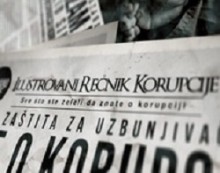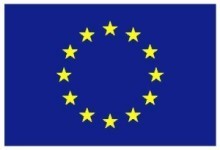17. 04. 2014
Third Cycle of Episodes of ANEM Series „Illustrated Glossary of Corruption“ Available on ANEM website

The five television episodes featured here cover the following topics: Conflict of Interest, Pantouflage (fr.), Gift, Misuse of Public Resources, Whistleblower, while the radio episodes cover the topics: Gift, Transparency in the Work of Public Authorities, Oversight and Control of Budget Expenditures, Meaningful Expenditure of Public Funds, Misuse of Public Resources.
The episodes are available (only in Serbian) under this text. Short descriptions of the episodes are available here:
CONFLICT OF INTEREST (TV episode)
Conflict of interest opens the door wide to corruption, abuse of public resources, abuse of power and bribery. That is why the removal of conflict of interest and its prevention is one of the most important mechanisms for dealing with corruption. The most frequent and the most widespread from of this illicit behavior of public officials is simultaneous discarging of executive and legislative authority - for example, simultaneous discharge of the function of a mayor and an MP. Many public officials throughout Serbia have attempted to keep both functions. The team of the „Illustrated Glossary of Corruption" talked about this problem to the mayor of Pirot Vladan Vasić. Experts of the Anti-Corruption Agency and representatives of the non-governmental sector talk about the efficiency of protection mechanisms at the disposal of responsible institutions.
PANTOUFLAGE (TV episode)
Pantouflage, or employment or cooperation of a former public public official with enterprises or organizations the activities of which are related to the public office function the person used to discharge, can lead a former public official into a serious conflict of interest. In order to prevent this, the Law on the Anti-Corruption Agency prescribes that a public official cannot find employment that could lead him into such conflict of interest two years after the end of the public office employment. The team of the „Illustrated Glossary of Corruption" recorded an example of violation of the Law on the Anti-Corruption Agency in Niš, where the former head of the city Directorate for Public Utilities several days after he finished discharging this function found employment in a private enterprise which does business with the city of Niš. Former and current City Council members Biljana Jovanović and Miloš Banđur, and Dejan Milić, head of the Office for Resolving Conflict of Interest of the Anti-Corruption Agency, talk about the consequences of this corruptive phenomenon and legal possibilities for dealing with it.
GIFT (TV and Radio episodes)
What does it mean when a public official receives a gift - is the old Serbian custom not to visit someone emptyhanded merely an act of kindness or can it be, in the case when gifts are given to those with political power, a very powerful and covert means of bribery and corruption? The records on received gifts kept by the Anti-Corruption Agency are extremely important because an attemp at bribery can be hidden behind a custom or a protocolary act. The team of the „Illustrated Glossary of Corruption" talked to Dragan Marković Palma, president of the Municipal Council in Jagodina, who has never, despite legal obligation, disclosed any of the gifts although he often boasted with them in the media. Tatjana Babić, director of the Anti-Corruption Agency and her assistant Dragomir Trninić talk about reasons why the Agency has not initiatied procedures so far for violation of the law on gifts.
MISUSE OF PUBLIC RESOURCES (TV and radio episodes)
Misuse of public resources is using state and public resources for personal purposes or for personal gain by public officials and employees of public authorities. The team of the „Illustrated Glossary of Corruption" recorded an example of misuse of public resources in Niš, where the adviser of the former director general of the Public Utility Company „Tržnice" used to spend the company money for private lunches and hotel accommodation. Nebojša Petrović and Radovan Milojević , former and current directors of „Tržnice" in Niš, and Marko Savić from the Niš branch of the organisation Transparency Serbia talk about mechanisms for the prevention and dealing with misuse in institutions and public enterprises.
WHISTLEBLOWER (TV episode)
Important witnesses of corruption and the abuse of power in institutions and public enterprises are precisely those who work in them. Unfortunately, they rarely summon courage to report corruption because there is still no systemic protection of so-called whistleblowers in Serbia, due to which they suffer grave consequences. Momčilo Cvetković, former head of the Veterinerian Inspection for Jablanica district, who was granted the status of a whistleblower by the Anti-Corruption Agency, talks about his experience. Current mechanisms showed to be insufficient and the adoption of the Law on the Protection of Whistleblowers is one of the priorities in the fight against corruption. Along with Cvetković, others interviewed for the "Illustrated Glossary of Corruption" are the director of the Anti-Corruption Agency Tatjana Babić and assistant director Nataša Jelić, the Ombudsman Saša Janković, the head of the Veterinarian Inspection of the Ministry of Agriculture Sanja Čelebićanin.
TRANSPARENCY IN THE WORK OF PUBLIC AUTHORITIES (Radio episode)
Transparency in the work of public authorities is a cure for corruption. Being exposed to the public view is particularly important when it comes to disposing with money and public resources. Citizens have a right to know what the authorities are doing and they should insist on this right, together with the media. The team of the „Illustrated Glossary of Corruption" searched for the answer to the question how to achieve this and talked about this issue with Branislav Nedimović, mayor of Sremska Mitrovica, Svetlana Cucanić, editor of "M novine", and Rodoljub Šabić, Commissioner for Information of Public Importance and Personal Data Protection.
OVERSIGHT AND CONTROL OF BUDGET EXPENDITURES (Radio episode)
Every time you go to a store and buy a product, you are filling up the public budget. From your pocket the money goes to the state budget every time you buy bread, milk, vegetables, meat, when you go to a petrol station or when you pay utilities. However, do you know how your money is being spent, who is supposed to control the spending and how important is the citizens' interest in monitoring how the authorities dispose with public money? The team of the "Illustrated Glossary of Corruption" posed these questions to the citizens of Požarevac and the representatives of local authorities which illegally spent 37 million dinars in 2011. The interviewees in this episode are high officals of the city of Požarevac and the president of the State Audit Institution Radoslav Sretenović.
MEANINGFUL EXPENDITURE OF PUBLIC FUNDS (Radio episode)
The issue of meaningful expenditure of public funds is most frequently reflected in the dilemma which public interest is more important. When there is not enough money in the budget for all the needs, than the criteria for setting priorities must be clearly defined, which is important not only because of saving money, but also to narrow the possibilities for corrupt behavior and to prevent public officials from setting priorities according to personal and party interests. The team of the „Illustrated Glossary of Corruption" recorded a story in Valjevo which opens numerous questions, among which is the question whether citizens' money is spent in a proper way. Namely, a part of budgetary resources was used for building a sports hall instead for the reparation of houses damaged by earthquake which hit the district of Kolubara 15 years ago. Officials of Valjevo, residents of Mionica and Nemanja Nenadić from the organisation Transparency Serbia talk about whether the money of the citizens of Valjevo and the district of Kolubara was spent in a proper way.
TV EPISODES
11. Sukob interesa (Conflict of Interest)
12. Pantoflaža (Pantouflage - fr.)
13. Poklon (Gift)
14. Zloupotreba javnih resursa (Misuse of Public Resources)
15. Uzbunjivač (Whistleblower)
RADIO EPISODES
11. Poklon (Gift)
12. Transparentnost organa javne vlasti (Transparency in the Work of Public Authorities)
13. Nadzor i kontrola trošenja budžetskih sredstava (Oversight and Control of Budget Expenditures)
14. Svrsishodnost trosenja javnih sredstava (Meaningful Expenditure of Public Funds)
15. Zloupotreba javih resursa (Misuse of Public Resources)

The contents of this text are the sole responsibility of ANEM and can in no way be taken to reflect the views and stands of the European Union.
-
No comments on this topic.





